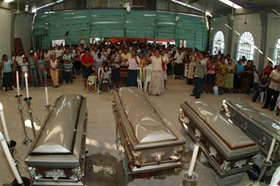 |
 |
 |
 Travel & Outdoors | April 2006 Travel & Outdoors | April 2006  
Avoid Crashing When Traveling Abroad
 Barbara Pinto - ABCNews Barbara Pinto - ABCNews


| | Friends and relatives hold a religious service in the town of Lagartera, Mexico on Tuesday, April 18, 2006 for 4 of the 57 people who died April 17 when a bus returning from a religious festival veered off a mountain road and crashed. Mexican authorities began flying the bodies of 57 crash victims home Tuesday, a day after the overloaded bus they were aboard careened off a highway into a 650-foot ravine. (AP/Luis Lopez) |
News of the deadly bus crash in Chile was a crushing reminder for Rochelle Sobel.

"It was horrible - like reliving it all over again," she says, her voice breaking.

Eleven years ago, her 25-year-old son, Aron, was killed, along with 22 others, in a similar bus accident in Turkey. He was just days away from his medical school graduation.

Rochelle Sobel would later learn the driver of the public transit bus that plunged down a ravine had been exhausted, and that the bus was unfit for use on narrow, winding roads.

In memory of her son, Sobel started the Association for Safe International Road Travel, a nonprofit group that works to improve traffic conditions around the world and provides international travelers with road-safety information.

"The single-greatest cause of death for healthy Americans traveling abroad is road crashes," says Sobel.

According to the U.S. State Department, 1.17 million people die every year in road accidents worldwide. That included 200 Americans killed in accidents abroad.

Another 50 million are injured every year in road accidents, according to the World Health Organization. The majority of traffic deaths - 70 percent - take place in developing countries and 65 percent involve pedestrians.

Vaction Mentality

Most people ask about immunizations before they travel overseas but few consider the safety issues they might encounter once they get there. Chicago-based travel consultant Ellen Morse calls it vacation mentality.

"We all want to go on vacation, and not think too much," she says. "But you can't afford to do that."

Morse suggests using a travel professional who deals with established tour companies and asking for recommendations. "Until I see a company has been around for a while, with a good record, I'm cautious," she adds.

Sobel says that travelers should be aware of a country's driving culture before they go. "Travelers should know what the safest mode of transportation is in the country they're visiting," she says. "Do they obey stop signs and respect traffic lights? Do traffic signs mean anything in that country?"

Her organization sells reports on traffic conditions in 150 countries to help travelers better assess the risks on foreign roads.

Experts also offer the following tips:

• If you plan to drive in other countries, check with your auto insurance company to see if your policy is valid outside the United States.

• If you are renting a car, ask if the vehicle has seat belts and air bags. Ask to see the car's maintenance records. Check the tires. Look under the hood.

• If you decide to take a tour bus, ask to see the company's safety records. Make sure the drivers are licensed. You may also want to ask if the drivers have time limits on how long they can drive without resting.

• Learn to say "stop" and "slow down" in the native language.

• If you are taking a taxi, ask if there are working seat belts.

Several Web sites offer more information on safe international travel, including the State Department, the World Health Organization, the American Automobile Association and the Association for Safe International Road Travel. | 
 | |
 |



